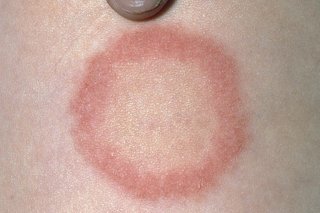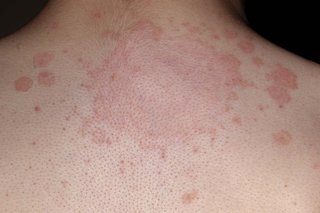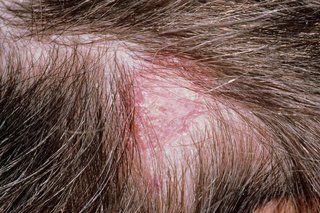Ringworm is a common fungal infection. It's not caused by worms. You can usually buy medicine from a pharmacy to make it go away.
Check if it's ringworm
The main symptom of ringworm is a red or silver rash. The rash may be scaly, dry, swollen or itchy.
Ringworm can appear anywhere on the body, including the scalp (tinea capitis) and groin (jock itch).

SCIENCE PHOTO LIBRARY

DR P. MARAZZI/SCIENCE PHOTO LIBRARY

DR P. MARAZZI/SCIENCE PHOTO LIBRARY
Other common fungal infections
A pharmacist can help with ringworm
Speak to a pharmacist first.
They can look at your rash and recommend the best antifungal medicine. This might be a cream, gel or spray depending on where the rash is.
You usually need to use antifungal medicine every day for 2 weeks. It's important to finish the whole course, even if your symptoms go away.
A pharmacist will tell you if they think you should see a GP.
Non-urgent advice: See a GP if:
- ringworm hasn't improved after using antifungal medicine for 2 weeks
- you have ringworm on your scalp – you'll often need prescription antifungal tablets and shampoo
- you have a weakened immune system – for example, from chemotherapy, steroids or diabetes
How ringworm spreads
Ringworm is caused by a type of fungi.
It can be spread through close contact with:
- an infected person or animal
- infected objects – such as bedsheets, combs or towels
- infected soil – although this is less common
It's fine for your child to go to school or nursery once they have started treatment. Let your child's teachers know they have it.
How to stop ringworm spreading
Do
-
start treatment as soon as possible
-
wash towels and bedsheets regularly
-
keep your skin clean and wash your hands after touching animals or soil
-
regularly check your skin if you have been in contact with an infected person or animal
-
take your pet to the vet if they might have ringworm (for example, patches of missing fur)
Don't
-
do not share towels, combs and bedsheets with someone who has ringworm
-
do not scratch a ringworm rash – this could spread it to other parts of your body
Page last reviewed: 8 September 2017
Next review due: 8 September 2020
